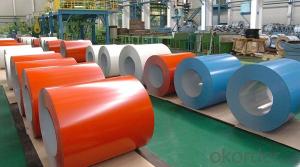PE and PVDF Color Coating Aluminum Coil Professional Manufacturer
- Loading Port:
- Shanghai
- Payment Terms:
- TT OR LC
- Min Order Qty:
- 5 m.t.
- Supply Capability:
- 10000 m.t./month
OKorder Service Pledge
OKorder Financial Service
You Might Also Like
Item specifice
1. Specification of PE and PVDF Color Coating Aluminum Coil Professional Manufacturer
characteristics | Application |
1) Super peeling strength | 1) Building exterior curtain walls |
2) Excellent surface flatness and smoothness | 2) Decoration and renovation additions for old buildings |
3) Superior weather, corrosion, pollutant resistance | 3) Decoration of interior walls, ceilings, bathrooms, kitchens and balconies |
4) Even coating, various colors | 4) Shop door decorations |
5) Fireproof, excellent heat and sound insulation | 5) Advertisement board display platforms and signboards |
6) Superior impact resistance | 6) Wallboards and ceilings for tunnels |
7) Lightweight and easy to process | 7) Industrial materials, materials for vehicles and boats |
2. Application of PE and PVDF Color Coating Aluminum Coil Professional Manufacturer
(1).Interior: wall cladding, ceilings, bathrooms, kitchens and balconies, shutters, doors...
(2).Exterior: wall cladding, facades, roofing, canopies, tunnels,column covers , renovations...
(3).Advertisement: display platforms, signboards, fascia, shop fronts...
3. Feature of PE and PVDF Color Coating Aluminum Coil Professional Manufacturer
*Such coil is specially designed to replace aluminum ingot, due to the high export tax of aluminum ingot, the coil has better price than ingot.
*This type of coil can fit customer's remelting furnace just like ingot, no need to make any change to the production line that was previously used for ingot. The standard coil size and weight is very suitable for the feed gate of furnace.
*This type of coil causes less material wastage than ingot when remelted.
*Our coil is made directly from ore, no need to go though the ingot making process, quality is much better than other suppliers who use ingot scrap to make coil.
Be free from Oil Stain, Dent, Inclusion, Scratches, Stain, Oxide Dicoloration, Breaks, Corrosion, Roll Marks, Dirt Streaks and other defect which will interfere with use
4. Certificate:
SGS and ROHS(if client request, paid by client), MTC(plant provided), Certificate of Origin(FORM A, FORM E, CO), Bureau Veritas and SGS (if client request, paid by client), CIQS certificate
5. Image of PE and PVDF Color Coating Aluminum Coil Professional Manufacturer
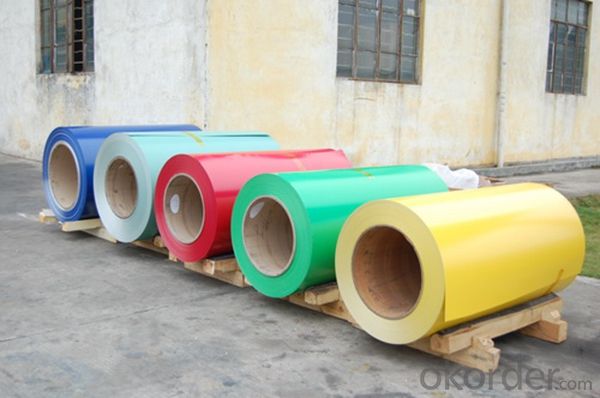
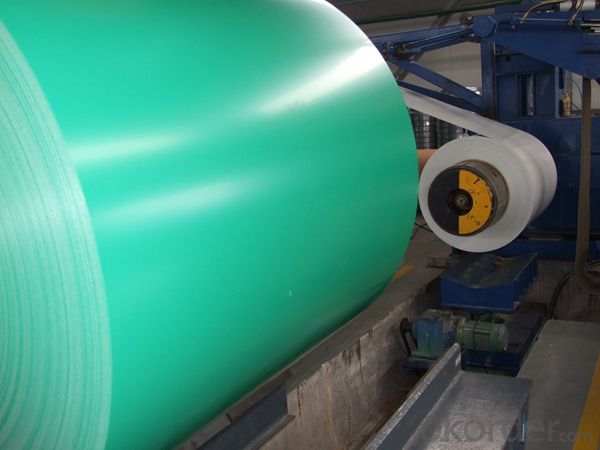
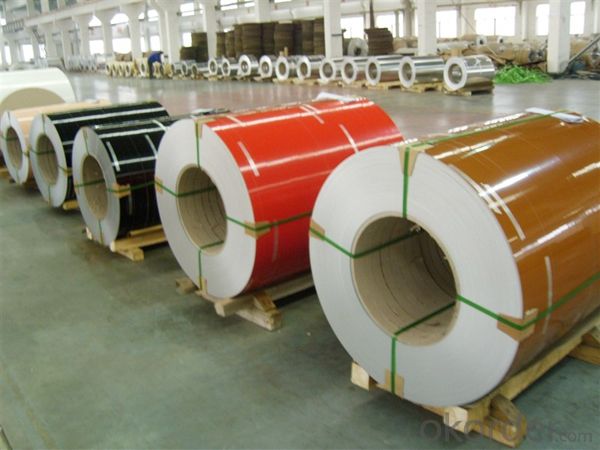
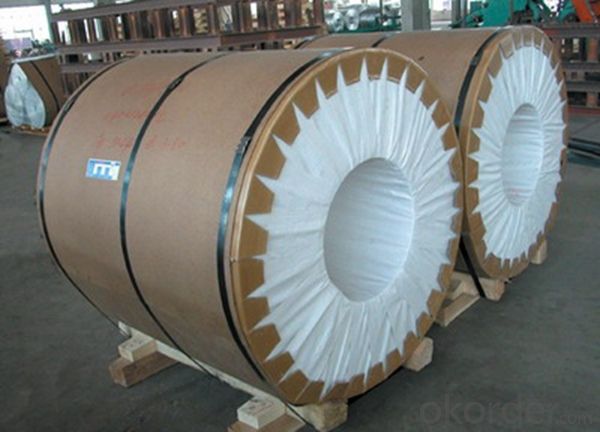
6. Package and shipping of PE and PVDF Color Coating Aluminum Coil Professional Manufacturer
eye to wall
eye to the wall
with wood pallet (wooded case also available)
7. FAQ
1) What is the delivery time?
Dpends on actual order, around 20 to 35 days
2)What is the QC system:
We have QC staff of 20 persons and advanced equipment, each production is with MTC traced from Aluminum ingot lot.
3) What market do you mainly sell to?
Australia, America, Asia, Middle East, Western Europe, Africa etc
- Q:Can aluminum coils be used in electrical or electronic applications?
- Yes, aluminum coils can be used in electrical or electronic applications. Aluminum is a highly conductive material and has several advantages over other materials, such as copper, when it comes to coil applications. Aluminum coils are lightweight, which makes them suitable for applications where weight is a concern. They also have good thermal conductivity, allowing for efficient heat dissipation. Additionally, aluminum coils are corrosion-resistant, making them durable and suitable for outdoor or high-humidity environments. However, it is important to note that aluminum has a lower electrical conductivity compared to copper, so the design and dimensions of the coil need to be carefully considered to ensure optimal performance.
- Q:Can aluminum coils be used in the production of window frames?
- Indeed, window frames can be produced by utilizing aluminum coils. Aluminum, as a lightweight and robust substance, finds frequent application within the construction sector owing to its resistance to corrosion and impressive strength. Aluminum coils can be effortlessly molded into numerous configurations, including those suitable for window frames, thereby rendering them an optimal selection for the fabrication of windows. Furthermore, aluminum qualifies as a sustainable material that can be effortlessly recycled, thus establishing it as an eco-friendly alternative for window frame manufacturing.
- Q:Can aluminum coils be painted or printed on?
- Yes, aluminum coils can be painted or printed on. Aluminum coils are often coated with a protective layer that allows them to be painted or printed on. This opens up a wide range of possibilities for customization and branding purposes.
- Q:How can you tell the difference between aluminum and other non-magnetic metals, such as what I've heard called, pot-metal?
- An aluminum bat hits a ball futher than a wooden bat since of the way the wooden bat bends when the ball makes contact, the wooden bat has a sweet spot while the metal one doesn't really have that spot but doesn't break like it's wooden counterpart so the metal bat gives the ball more pop.
- Q:Can aluminum coils be used for solar panel applications?
- Solar panel applications can utilize aluminum coils, which are lightweight and durable materials commonly employed in solar panel construction. Aluminum, an excellent conductor of electricity, is ideal for capturing and conducting solar energy. These coils can serve as backing materials for solar panels, offering structural support and aiding in heat dissipation. Furthermore, aluminum possesses good corrosion resistance, a crucial characteristic for solar panels exposed to diverse weather conditions. Ultimately, the strength, conductivity, and corrosion resistance of aluminum coils render them a favored choice for solar panel applications.
- Q:We have all heard the Us saying aluminum and their euro counterparts saying aluminium. I assumed this was just a small difference in culture or location. But, while reading my chemistry book (Chemistry the Central Science 12th) i came across a section saying: Cations formed from nonmetal atoms have names that end in -ium: NH4+ ammonIUM ion, H3O+ hydronIUM ion. So, i have came up with a hypothesis, could it be possible that when the periodic table was coming together, the aluminium was changed to aluminum to allow the rules to work? Thus making aluminum the correct spelling? Give me your thoughts.
- It just depends on which side of the Atlantic Ocean you live. Come to think of it though, most metals end in ium. Not just the ions.
- Q:What are the uses of aluminum coils?
- Aluminum coils have a wide array of applications in various industries. HVAC systems and air conditioning units heavily rely on aluminum coils for their heat transfer and air cooling functions. These coils are indispensable components in these systems. Moreover, the construction industry frequently utilizes aluminum coils for roofing, cladding, and insulation purposes. Their lightweight nature, durability, and resistance to corrosion make them perfect for outdoor applications. The automotive industry also incorporates aluminum coils in the production of vehicles. These coils are used in the manufacturing of various parts, including radiators, heat exchangers, and condensers, owing to their exceptional heat transfer properties. The packaging industry extensively depends on aluminum coils as well. These coils are employed in the production of cans and containers for food and beverages. Aluminum is an excellent choice for packaging due to its lightweight nature, recyclability, and ability to provide a barrier against moisture, oxygen, and light. This ensures the quality and freshness of the enclosed products. Furthermore, aluminum coils find applications in electrical wiring, where they serve as conductors due to their high electrical conductivity. They are also used in the production of electronics like laptops, smartphones, and tablets, as they possess excellent heat dissipation properties. In conclusion, the uses of aluminum coils span across a diverse range of industries, including HVAC systems, construction, automotive, packaging, and electrical applications. The versatility, durability, and exceptional properties of aluminum make it a favored material choice in numerous sectors.
- Q:What is the typical lifespan of an aluminum coil?
- The typical lifespan of an aluminum coil can vary depending on factors such as usage, maintenance, and environmental conditions. However, with proper care and regular maintenance, an aluminum coil can last anywhere from 20 to 30 years or even longer. This lifespan can be extended by keeping the coil clean, ensuring proper ventilation to prevent moisture buildup, and addressing any damages or issues promptly. Additionally, factors such as exposure to harsh weather conditions, chemicals, or corrosive environments can impact the lifespan of an aluminum coil. It is important to consult with manufacturers or industry professionals for specific information regarding the expected lifespan of a particular aluminum coil in different applications.
- Q:How are aluminum coils cut to size?
- Aluminum coils are typically cut to size using specialized coil slitting machines. These machines have rotating circular blades that make precise cuts along the length of the coil. The coil is fed through the machine, and the blades cut the aluminum into the desired width. The cut pieces are then collected and further processed or used for various applications.
- Q:How long do aluminum coils typically last?
- Aluminum coils typically have a lifespan of around 15 to 20 years. However, the longevity of the coils greatly depends on several factors such as the quality of the aluminum used, the installation process, and the maintenance and care provided. Regular maintenance, such as cleaning the coils and ensuring proper airflow, can significantly extend their lifespan. Additionally, environmental factors like exposure to harsh weather conditions and corrosive substances can also affect their durability. Therefore, while aluminum coils have a decent lifespan, it is essential to provide proper care and maintenance to ensure their longevity.
1. Manufacturer Overview |
|
|---|---|
| Location | |
| Year Established | |
| Annual Output Value | |
| Main Markets | |
| Company Certifications | |
2. Manufacturer Certificates |
|
|---|---|
| a) Certification Name | |
| Range | |
| Reference | |
| Validity Period | |
3. Manufacturer Capability |
|
|---|---|
| a)Trade Capacity | |
| Nearest Port | |
| Export Percentage | |
| No.of Employees in Trade Department | |
| Language Spoken: | |
| b)Factory Information | |
| Factory Size: | |
| No. of Production Lines | |
| Contract Manufacturing | |
| Product Price Range | |
Send your message to us
PE and PVDF Color Coating Aluminum Coil Professional Manufacturer
- Loading Port:
- Shanghai
- Payment Terms:
- TT OR LC
- Min Order Qty:
- 5 m.t.
- Supply Capability:
- 10000 m.t./month
OKorder Service Pledge
OKorder Financial Service
Similar products
New products
Hot products
Related keywords
